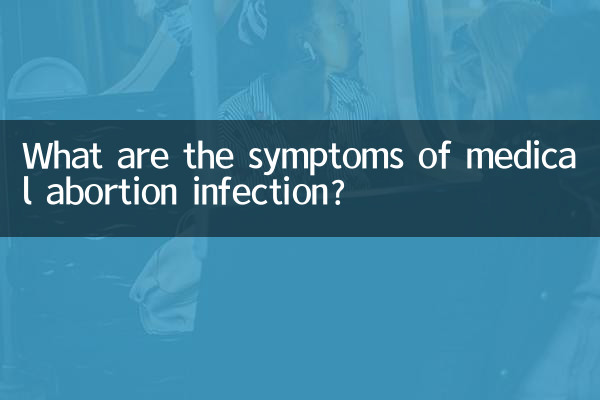What are the symptoms of medical abortion infection?
Medical abortion (medical abortion) is a common method of terminating early pregnancy, but it can lead to infection if care is not taken during or after the procedure. If the infection is not treated promptly, it can lead to serious health problems. The following is a detailed analysis of the symptoms of medical abortion infection, compiled based on the hot topics and hot content on the Internet in the past 10 days.
1. Symptoms of medical abortion infection

Symptoms of medical abortion may vary from person to person, but here are some common signs:
| symptom | describe |
|---|---|
| fever | Body temperature over 38°C, possibly accompanied by chills |
| lower abdominal pain | Persistent or severe pain that may radiate to the lower back |
| Abnormal discharge | Increased, smelly, or purulent discharge |
| vaginal bleeding | Bleeding that exceeds menstrual flow or lasts for too long (more than 2 weeks) |
| General fatigue | Feeling weak, dizzy, or nauseous |
| Frequent or painful urination | May be accompanied by difficulty urinating or a burning sensation |
2. Causes of medical abortion infection
Medical abortion infections are usually related to the following factors:
| reason | illustrate |
|---|---|
| Irregular operation | Medical abortion is not performed in a formal medical institution, or drugs are used improperly |
| Improper post-operative care | Failure to take rest as prescribed by the doctor, having sex too early, or using unclean sanitary products |
| residual tissue | Incomplete medical abortion leads to residual tissue in the uterus, causing infection |
| low immunity | After surgery, the body is weak and vulnerable to bacterial or viral attack |
3. How to prevent medical abortion infection
Preventing infection is the key to post-medical abortion care. Here are some suggestions:
| Precautions | Specific practices |
|---|---|
| Choose a formal medical institution | Ensure that the medical abortion process is standardized and the source of drugs is reliable |
| Take medication as directed by your doctor | Take antibiotics or anti-inflammatory drugs on time to prevent infection |
| Pay attention to personal hygiene | Change sanitary napkins frequently and avoid bathing or swimming |
| Avoid strenuous exercise | Rest appropriately after surgery to avoid overexertion |
| Regular review | Ensure complete medical abortion, detect and deal with problems in a timely manner |
4. Treatment after infection
If symptoms of infection occur, seek medical attention promptly to avoid delays in treatment:
| Processing method | illustrate |
|---|---|
| Medical examination | Confirm the degree of infection through B-ultrasound, routine blood tests and other tests |
| antibiotic treatment | Use antibiotics as recommended by your doctor to control infection |
| uterine curettage surgery | If medical abortion is incomplete, surgery may be required to remove residual tissue. |
| rest and nutrition | Enhance nutritional intake and promote body recovery |
5. The relationship between hot topics on the Internet and medical abortion infection
In the past 10 days, discussions about medical abortion infections have mainly focused on the following hot spots:
| hot topics | Related content |
|---|---|
| Safety of medical abortion | Netizens are hotly discussing the risk comparison between medical abortion and surgical abortion. |
| Postoperative care misunderstandings | Many people neglect rest after surgery, leading to increased infection rates |
| Misunderstandings about self-diagnosis | Some women use the Internet to judge symptoms on their own and delay treatment. |
| Distribution of medical resources | The infection rate of medical abortion is relatively high in remote areas, causing concern |
6. Summary
Medical abortion infection is a preventable complication, but it requires great attention. If symptoms such as fever, abdominal pain, abnormal secretions, etc. occur, you should seek medical treatment in time. Choosing a regular medical institution, following doctor's instructions for care, and conducting regular check-ups are the keys to reducing the risk of infection. The recent heated discussion about medical abortion across the Internet also reminds us that scientific understanding and standardized operation are important links in protecting women's health.
We hope that the detailed analysis in this article can help everyone better understand the symptoms, causes and countermeasures of medical abortion infection, and avoid serious consequences due to negligence.

check the details

check the details